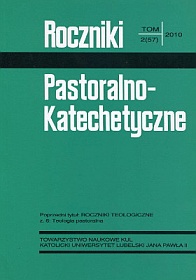The Unique Character of Charity Work of the Church according to Cardinal Paul Josef Cordes
Abstract
When announcing the encyclical Deus Caritas Est on December 25, 2005, Pope Benedict XVI added momentum to the discussion of the essence and unique nature of the Church’s charity work. In the discussion of such work, among others, P.J. Cordes’ voice is not to be ignored, not only due to the high position he holds (President of the Papal Council “Cor Unum”) but also his influential publications on charity theology, especially his latest book entitled: Helfer fallen nicht vom Himmel. Caritas und Spiritualität (Eng. Those who give help do not descend from heaven. Caritas and spirituality). In Cardinal’s view, nowadays institutionalized charity work demands an insight into political, economic, sanitary, anthropological and administrative spheres as well as practical skills proved by appropriate certificates. All of this is important and necessary, yet insufficient from the perspective of the charity organizations of the Catholic Church. Only a shift from the legal paradigm to the one of faith will permit a deeper insight into human poverty. Therefore, professionalization of the forms and means should be accompanied by a greater concern for spiritual formation of people who are either professionally or voluntarily involved in the charity mission of the Church.
References
Benedikt XVI.: Gott ist die Liebe. Die Enzyklika „Deus caritas est“. Ökumenisch kommentiert von Bischof Wolfgang Huber, Metropolit Augoustinos Labardakis, Karl Kardinal Lehmann. Freiburg–Basel–Wien: Herder 2006.
Benedikt XVI.: Encyklika o miłości Boga i człowieka. Przemówienie do uczestników spotkania zorganizowanego przez Papieską Radę „Cor Unum”. Watykan 23 I 2006. „L’Ossservatore Romano” (wyd. polskie) 27:2006 nr 4 s. 26-27.
Haslinger H.: Diakonie zwischen Mensch, Kirche und Gesellschaft. Eine praktisch-theologische Untersuchung der diakonischen Praxis unter dem Kriterium des Subjektseins des Menschen. Würzburg: Echter 1996.
Kalinowski M. (red.): Środowiska specjalnej troski. Lublin: Polihymnia 2003.
Koral J.: Podstawy działalności charytatywnej Kościoła na przykładzie organizacji Caritas. Studium etyczno-społeczne. Kraków: Wydawnictwo Salezjańskie 2000.
Pompey H., Roß P.S.: Kirche für andere. Handbuch für eine diakonische Praxis. Mainz: Matthias-Grünewald 1998.
Przygoda W.: Diakonia charytatywna Kościoła w świetle encykliki Benedykta XVI „Deus caritas est”. W: Ku nowej wyobraźni miłosierdzia. Materiały z II Kongresu Miłosierdzia Bożego w Archidiecezji Białostockiej. Red. A. Skreczko. Białystok: Kuria Metropolitalna Białostocka 2007 s. 96-107.
Przygoda W.: Duchowe fundamenty postawy proegzystencji wolontariuszy. W: Nic nie zastąpi miłości. Materiały z sympozjum naukowego poświęconego duchowości Caritas. Warszawa, 4 X 2008. Red. Z. Sobolewski. Kielce: Jedność 2009 s. 241-257.
Przygoda W.: Słowo Boże jako źródło działalności charytatywnej. W: Słowo Boże w Kościele. Red. R. Kuligowski, M. Jagodziński, D. Swend. Warszawa: Wydawnictwo UKSW 2009 s. 151-164.
Przygoda W., Karbownik J. (red.): Miłość na nowo odkryta. Skarżysko-Kamienna [Radom: Polwen] 2007.
Sobolewski Z. (red.): Nic nie zastąpi miłości. Materiały z sympozjum naukowego poświęconego duchowości Caritas. Warszawa, 4 X 2008. Red. Z. Sobolewski. Kielce: Jedność 2009.
Zerfaß R. Lebensnerv Caritas. Helfer brauchen Rückhalt. Freiburg: Herder 1992

